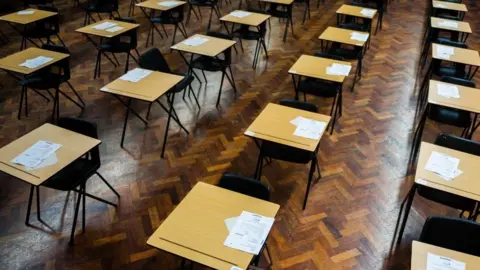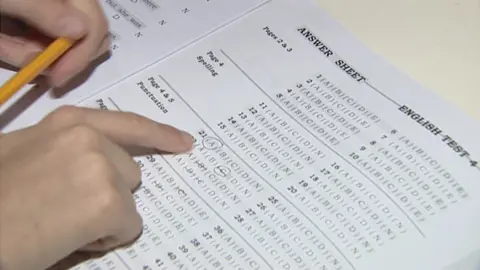Transfer test: Academic selection 'perpetuates divisions'
 Getty Images
Getty ImagesAcademic selection perpetuates divisions in wider society in Northern Ireland, according to a research paper by academics from Queen's University (QUB).
They found that transfer tests and the grammar school system "disadvantages the already most disadvantaged".
The paper called "Is academic selection in Northern Ireland a barrier to social cohesion?" has just been published.
The first transfer test of 2022 is due to be held on Saturday.
There will then be further tests, used by grammar schools to select pupil, on subsequent Saturdays.
However, a common post-primary transfer test is set to go ahead in November 2023, bringing to an end the current separate tests run by AQE and PPTC.
The common test run by the Schools Entrance Assessment Group (SEAG) is the biggest change to the post-primary transfer system since 2008, when the state run 11-plus test ended after about 60 years.
'Middle-class advantage'
But in their paper, Prof Joanne Hughes and Dr Rebecca Loader from QUB argued that equality and equity are casualties of a deeply-flawed system.
"Academic selection perpetuates middle-class advantage and limits potential for the development of a more integrative and inclusive education system," they said.
"In a society emerging from conflict, those in more marginalised communities experience the consequences of this most acutely.
"In communities that are historically segregated and susceptible to paramilitary control, educational failure and the absence of social mobility are more likely to manifest in violence and intergroup hostility.
"This system disadvantages the already most disadvantaged.
"Cross-cutting middle-class interests have served to mobilise a grammar school lobby, comprising both Catholics and Protestants, that has acted decisively to protect its privilege."

Prof Hughes and Dr Loader also called academic selection a linchpin of the divided education system which "serves to perpetuate class and group divisions within and between school sectors, and across wider society in Northern Ireland".
They said the grammar school system "may act to increase the likelihood of intergroup tension and violence".
"The dynamic of a selective system, mapped also on Catholic and Protestant lines, works against children and young people from different socio-economic backgrounds learning together, within and between communities," their paper said.
It also said as the transfer tests focused on maths and English, other subjects like history, geography, art and music could be taught less to older pupils in some primary schools.
"The de-prioritisation of these subjects, and the associated devaluing of their worth, is especially pernicious in Northern Ireland given both the orientation of civic-related subjects to fostering peacebuilding and conflict recovery, and the association of the arts with health and well-being," the paper stated.
The QUB academics were also critical of the Northern Ireland Executive and recent education ministers who, they said, had resisted intervening in the transfer test system.
"It seems particularly egregious that the young and most vulnerable in the most disadvantaged Catholic and Protestant communities are the victims of an education system that manifestly fails to serve their interests."
Other research in recent years from Stranmillis University College and Ulster University has also been critical of aspects of academic selection.
However, more than 10,000 children are entered for the transfer tests every year.
"Is academic selection in Northern Ireland a barrier to social cohesion?" has been published in the Research Papers in Education journal.
